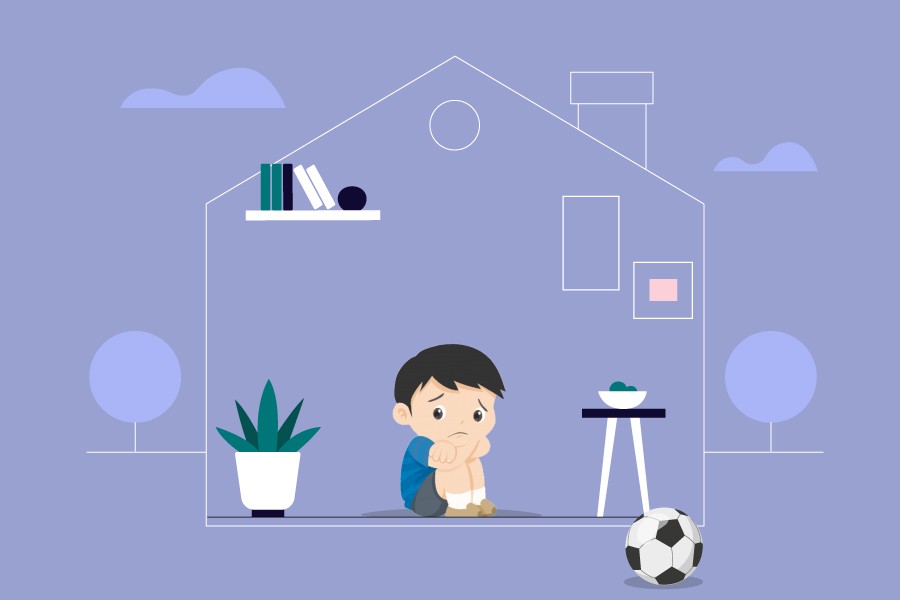A kindergarten student, Sadiq, hasn't recently sat to study or tried to play with his toys at all. Rather, he remains stuck at the mobile screen for a big part of the day. There are several other behavioural changes with him like fewer interactions with family members, untimely sleeping habits, getting angry for nothing, etc. When asked about the reason behind all these sudden changes, his mother Lucky Akhter, a housewife, said, “Being stuck at home for a prolonged time is affecting him mentally.” Since his school, ‘Paramount Child Academy,’ located at Ashulia, Savar, was closed in March, his opportunity of going out and playing with other kids has ceased to exist. Indeed, this sudden break in the normal flow of kids’ life has put tremendous pressure on their mental health.
In the backdrop of recent shutdowns and all other depressing pandemic issues, this is no alien scenario. In fact, the situation is worse in many cases, as a child helpline recently intervened in six cases of potential suicides in the span of a week. According to a UNICEF report, there have been a heap of calls from children suffering from physical and mental abuse amid lockdown in South Asia.
Children are the worst sufferers
Aiysha Malik, a WHO mental health expert, believes children are among the most affected groups in this unique crisis, and they are likely to be experiencing worry, anxiety, and fear. The pandemic and the related stay-at-home measures have a substantial influence on the mental wellbeing of people, mainly children. Since the beginning of the lockdown in March, some 3.7 million school-going children in Bangladesh have somewhat been at risk of it.
After the lockdown began, Amena --the mother of a 10-year-old boy named Ayman from Banani in Dhaka city-- has seen a drastic change in her son’s routine. Her son, who had always been active when the school was open, is nowadays having trouble waking up in the morning and feels soporific all day long. Talking to the mothers of some of Ayman’s classmates, she came to know that the children of his son’s age group are facing similar problems. Studies show that when children stay out of school for a prolonged period, they become physically less active. Also, higher screen time and irregular sleep cycles result in gaining weight and lack of cardio-respiratory performance.
What data and experts say
There are very little research and data available on the impact of the pandemic situation on children’s mental health in Bangladesh. According to a cross-sectional study in 2020, a large portion of children in Bangladesh is suffering from mental health troubles because of staying at home for a longer period. An online survey conducted between April 25 and May 9 revealed that around 43 per cent of children had sub-threshold disturbance, 30.5 per cent had mild disturbance, 19.3 per cent had moderate disturbance, and 7.2 per cent had severe disturbance.
An increase in the unemployment rate and other financial crises have a role in it too. According to Ezra Golberstein, a health-policy researcher at the University of Minnesota, an increase in the national unemployment rate is correlated with an increase in childhood mental health problems. When the economy is in a bad phase, kids’ mental health gets worse due to family financial crises. And now that is a pandemic, the situation is going to be much worse.
Psychologist Robin Gurwitch, professor at Duke University Medical Center, found that children who were struggling before the pandemic are at higher risk now. According to the National Mental Health Survey of Bangladesh 2018-19, at least 13.6 per cent of children between 7 and 14 years of age in Bangladesh suffered mental disorders. The regional director of UNICEF, Mr Jean Gough, fears that the economic crisis coupled with the pandemic might affect children’s mental health on an unprecedented scale.
What's the way out?
To mitigate the consequences of home confinement, the government, NGOs, community, schools, and most importantly parents need to be aware of the downside of the situation and do more to effectively address these issues. By actively promoting a health-conscious schedule, good personal hygiene, encouraging physical activities, appropriate diet, and good sleep habits, and integrating health promotion materials into the curriculum, schools can play an effective role in this regard, according to a research by the Lancet.
However, parents are the most crucial stakeholders here to look after their children’s mental health. They should show less stress or anxiety at home as children receive negative energy from that. They can also help children reduce stress and anxiety by participating in healthy activities together. Overall, children’s spending time with family members, participating in different exercises and sports activities, maintaining schedule and taking a break from traditional and social media can help them overcome mental health issues.
The WHO has announced that the agency is preparing a set of guidelines addressing the mental wellbeing for children aged 4 to 10 and it will be released soon. Bangladesh can take help from WHO and UNICEF to develop a proper guideline to mitigate the impact on the mental health of children in this situation. Policymakers can also consult successful guidelines of other countries, for example, the UK.
For years, Bangladesh has been reaping the benefit of its higher population for its development and growth. It must be kept in mind that the children of today will build up the economy in the future. Hence, it is of high importance to ensure that they grow both physically and mentally to become the active ideal citizens of tomorrow.
Faria Tabassum is a former researcher at the Institute for Policy, Advocacy, and Governance (IPAG). She can be reached at [email protected].


